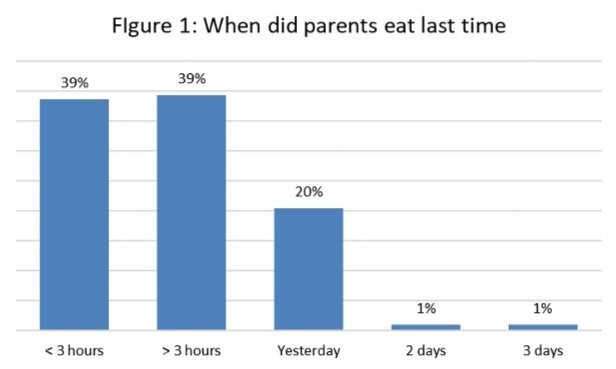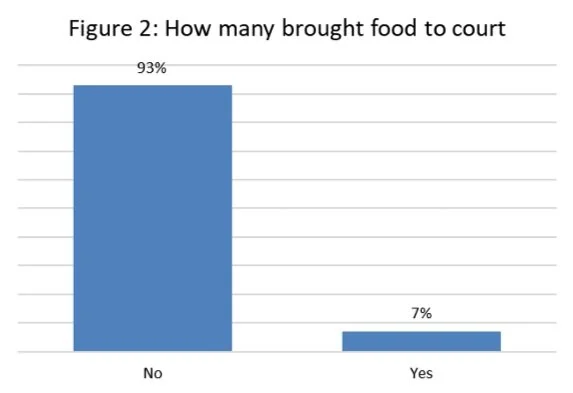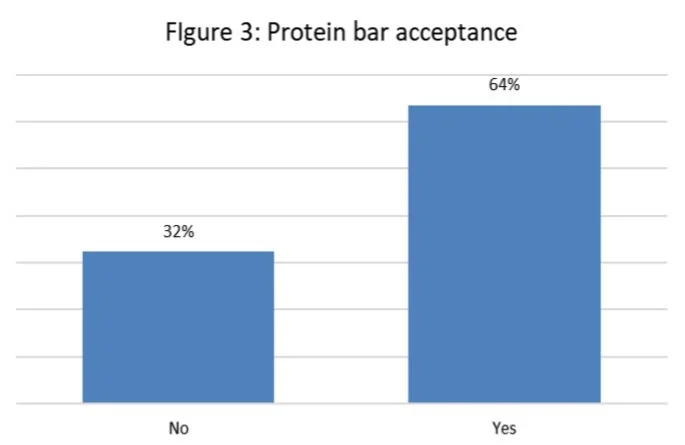The long-term continuation of a program is often determined by knowing it is making a difference.
A few years back, a preliminary study was done in Spokane, WA. The target audience for the study was parents attending the initial court hearings during a morning court docket. Several volunteers, mostly parents’ alumni, approached the participants shortly after their arrival at the courthouse with a set of questions. Approximately 378 parents were approached, but not everybody answered the survey questions, nor did everyone accept the protein.
The results suggest that a significant number of parents may be experiencing food insecurity. Here's a breakdown of the findings and their implications for the Protein for All program:
Survey insights on food insecurity
a. Twenty percent (N=66) of respondents reported not having eaten since the previous day, and an additional 2% (N=6) said they hadn't eaten in more than a day (see Figure 1). This indicates that a significant number of program participants struggle to access adequate food.
b. Thirty-nine percent (N=125) of parents ate within the last three hours. However, this does not necessarily mean they have enough or nutritionally adequate food, only that they ate recently.
c. Another 39% (N=127) reported having eaten more than three hours ago.
These findings demonstrate a clear need for the Protein for All program to support those with inconsistent and/or insufficient food access. By addressing both immediate and longer-term food security needs, the program can significantly improve the well-being of the parents coming to courts.
Recommendation:
To gain a clearer understanding of participants' last meal times, add a follow-up question about reasons for not eating for more than three hours. There could be various reasons for prolonged periods without eating, including fasting, cultural food preferences and dietary restrictions, busy schedules, medical conditions, or personal preferences. Understanding this context would provide more insight into the data collected.
The majority did not bring food with them to the courthouse
The study showed that 93% (300 out of 323) of the people who replied to the survey did not bring food with them, and only 7% (23 out of 323) did (see Figure 2). The data also suggest that people who ate more recently were somewhat more likely to bring food with them:
Recently Eaten (<3 hours ago): Among those who ate within the last three hours, about 1 out of every 10 people (or 10%) brought food with them to court.
Ate Earlier (>3 hours ago or yesterday): For those who ate more than three hours ago or yesterday, an even smaller percentage, roughly 1 in 16 people (or around 6%), brought their own food.
Not Eaten in the last 2 or 3 days: None of the individuals who hadn't eaten earlier than yesterday (which was 6 people) brought any food
A main takeaway from these results is that a majority (93%) of people who came to the courthouse did not bring their own food.
Who grabbed a protein bar?
The results of the survey show that a majority of people (64%, N=239) who responded to the survey reported taking a protein bar, while 32% (N= 122) did not take it (see Figure 3). Additionally, 18 people chose not to answer the question about whether or not they took a protein bar.
The highest percentage of protein bar acceptance (88%) occurred among those who have eaten more than 3 hours ago. This suggests that people are more likely to reach for a protein bar when they haven’t eaten recently.
The chances of taking a protein bar were similar (around 67%) for those who ate less than 3 hours ago, yesterday, or more than a day before the hearings.
Interestingly, bringing their own food didn't affect people's decision to take a protein bar. Specifically, there was no significant difference in protein bar acceptance between those who brought their own food (18 out of 23, or 78% acceptance) and those who didn't (72%).
A main takeaway is that these results suggest that offering protein bars at the courthouse is a well-received initiative. A majority of people who responded to the survey accepted a protein bar.
Recommendation
The current data doesn't tell us the whole story about why some people didn't take protein bars. To understand their motivations, a question could be added to the survey directly asking them why they declined a protein bar. Some people might have dietary restrictions that prevent them from consuming protein bars due to allergies, sensitivities, or following specific diets. It's possible some people simply don't like protein bars or prefer other snacks. Individual preferences and dietary habits vary, so flexibility and customization are key. Overall, gathering more data on why people decline protein bars will allow programs to be more flexible and adapt your offerings to better suit your community’s needs.
Protein consumption prior to court attendance
The survey examined participants' last meal choices, specifically focusing on protein intake. Researchers categorized responses based on their best guess whether protein was a part of the meal or marked it as "maybe" when uncertain.
Here are the key findings:
Ate Earlier (>3 hours ago): Over half (53%) of respondents who hadn't eaten in over 3 hours included protein in their last meal, marking the highest percentage.
Surprisingly, there was no significant difference in protein intake between individuals who had eaten less than 3 hours ago (39%) and those who ate yesterday (39%). This suggests that the timing of the last meal does not consistently correlate with protein consumption, indicating other factors influence protein choices.
Not Eaten in the last 3 days: Notably, 2 out of the 3 respondents who had their last meal three days ago included protein as part of their meal.
Last meal timing and emotional state prior to court hearing
The study showed that 47% (150 out of 354) of respondents presented as anxious, detached, or irritable shortly after arriving at the courthouse. [Note: Engagement levels were measured shortly after the arrival at the courthouse by volunteer researchers, ensuring immediate and relevant data collection].
Longer Periods Without Eating: 83% (or 5 out of 6) individuals who hadn't eaten for 2 or 3 days presented as anxious, detached, or irritable shortly prior to the court hearing.
Eating Yesterday: Participants who had eaten their last meal yesterday displayed mixed behaviors, with 49% being engaged before the court hearing and 51% being anxious, detached, or irritable shortly after arriving.
Recent Meals (Less than 3 Hours Ago): Among those who had eaten less than 3 hours ago, 59% were engaged prior to the hearing. Conversely, among those who had eaten more than 3 hours ago, only 44% were engaged, suggesting that shorter durations since the last meal may be linked to higher engagement levels.
Recommendation:
To assess the impact of providing protein bars on engagement levels, it is recommended that engagement is observed and measured within the courtroom setting. This will help determine if the immediate nutritional support translates to sustained engagement during court proceedings.
Even the most basic data collection highlights the human component of entering the complexity of the court system.
Start where you can and build from there.
For those in Washington State: The Administration Office of the Courts is committed to supporting the establishment of Protein for All programs throughout the State of Washington. More information about how to collect data for Protein for All programs can be found at WAcita.org/protein-for-all





